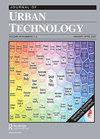In the Excess of Splintering Urbanism: The Racialized Political Economy of Infrastructure
IF 4.6
3区 经济学
Q1 URBAN STUDIES
引用次数: 5
Abstract
ABSTRACT This intervention discusses the relevance of settler colonialism and racial capitalism in the study of splintering urbanism, as an uneven socio-spatial process that simultaneously produces dispossession and racial differentiation. Reflecting on our work in Palestine and South Africa we grapple with what leaks in processes of splintering urbanism and we propose “excess” as a provisional analytical space to focus on the racialized political economies of infrastructure. We argue that excess is a generative concept: to render legible the often-silenced histories, geographies, and experiences produced and managed through infrastructure; to reflect on the way stratified social relations materialize in and through urban networks; and to speculate on liberating horizons. In doing so, we consider infrastructure as an archive, a lively ethnographic repository where modern histories of excess live, and where the contested material relations of racialized political economies unravel.在城市主义分裂的过剩中:基础设施的种族化政治经济学
本文讨论了移民殖民主义和种族资本主义在分裂的城市主义研究中的相关性,作为一个同时产生剥夺和种族分化的不平衡的社会空间过程。反思我们在巴勒斯坦和南非的工作,我们努力解决城市主义分裂过程中的漏洞,我们提出“过剩”作为一个临时分析空间,专注于基础设施的种族化政治经济。我们认为,过剩是一个生成概念:通过基础设施生产和管理,使经常沉默的历史、地理和经验变得清晰;反思分层的社会关系在城市网络中以及通过城市网络实现的方式;并推测解放的视野。在这样做的过程中,我们将基础设施视为一个档案,一个生动的民族志储存库,其中存在着现代过剩的历史,以及种族化政治经济中有争议的物质关系。
本文章由计算机程序翻译,如有差异,请以英文原文为准。
求助全文
约1分钟内获得全文
求助全文
来源期刊

Journal of Urban Technology
URBAN STUDIES-
CiteScore
8.50
自引率
4.20%
发文量
42
期刊介绍:
The Journal of Urban Technology publishes articles that review and analyze developments in urban technologies as well as articles that study the history and the political, economic, environmental, social, esthetic, and ethical effects of those technologies. The goal of the journal is, through education and discussion, to maximize the positive and minimize the adverse effects of technology on cities. The journal"s mission is to open a conversation between specialists and non-specialists (or among practitioners of different specialities) and is designed for both scholars and a general audience whose businesses, occupations, professions, or studies require that they become aware of the effects of new technologies on urban environments.
 求助内容:
求助内容: 应助结果提醒方式:
应助结果提醒方式:


